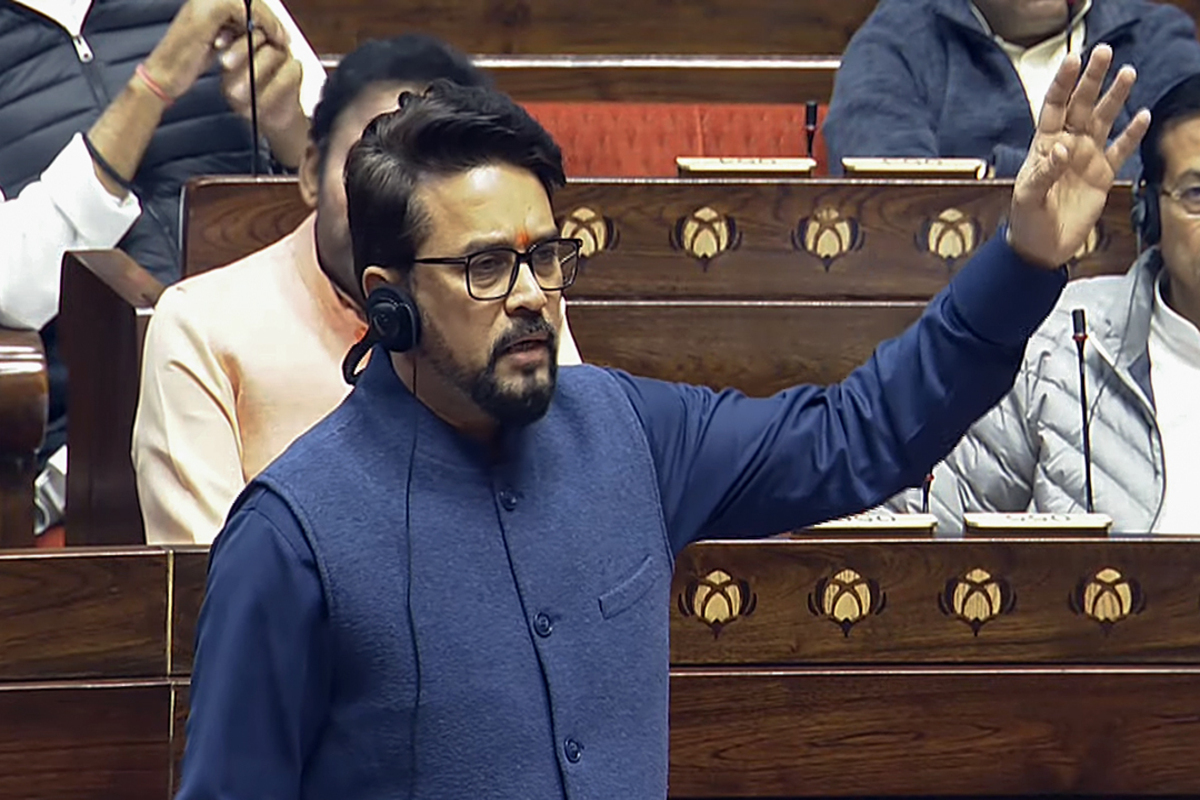In a bid to damage India, Pakistan has destabilised itself: Anurag Thakur
Senior BJP leader and former minister Anurag Thakur said on Monday that Pakistan has destabilised itself while trying to damage India.
Information and Broadcasting Minister Anurag Thakur was replying to a debate on the Bill which was later passed by the House. The Bill was already passed by the Rajya Sabha.

New Delhi, Dec 21 (ANI): Union Minister of Information and Broadcasting Anurag Thakur speaks in the Rajya Sabha during the Winter Session of Parliament, in New Delhi on Thursday. (ANI Photo/SansadTV)
Information and Broadcasting Minister Anurag Thakur on Thursday told the Lok Sabha that the Press and Registration of Periodicals Bill, 2023 will abolish a law enacted with a colonial mindset and allow registration of new newspapers and periodicals in 60 days.
He was replying to a debate on the Bill which was later passed by the House. The Bill was already passed by the Rajya Sabha.
Advertisement
The Minister said the Bill replaced the 1867 Act which aimed at discouraging freedom of expression by delaying registration of new newspapers. There were provisions for imprisonment for small mistakes.
Advertisement
The new law will give ease of doing business, and the media will be able to play its due role in achieving the goal of Developed India by 2047. Media will prosper as a result of the new law, he said.
One can apply for registration of a new newspaper simultaneously with the District Magistrate and the Registrar of Newspapers for India (RNI), and if there is no response from the DM for 60 days, one will get registration from the RNI, he said.
He said the earlier law was meant to suppress, put restrictions on launch of new publications and now opportunities will be given to grow and prosper. Never before in the last 75 years there has been so much freedom of press as during the Narendra Modi government. Press was suppressed during the Emergency.
Mr Thakur said he did not understand how could there be criticism of the Bill. Only those who loved inspector-raj could be unhappy with the Bill, he said. He said the 2011 Bill brought during the UPA rule carried the imprint of the 1867 mindset. It introduced permission for even college journals.
There were eight steps to get registration earlier and now an application can be made to the DM and the RNI at one time. An online application can be made to the RNI with copy to the DM and in 60 days, and if there is no reply from the DM, one will get title cleared for publication from the RNI. Permission can be taken to print Indian editions of foreign newspapers. Digital news is covered under IT Act, 2021, he said.
Publication of books has been taken out of the law’s purview, he said, and the law is now limited to newspapers and periodicals. There will be a big change. Mr Thakur said even in the past Jan Sangh and BJP had fought for press freedom.
Security of press persons is responsibility of State Governments, he said. Electronic media is covered under cable television network and IT Rules. Social media is a new emerging area, gives jobs to many people; there can be online intimation for this. An ad policy has come for digital platforms.
There was a baseless allegation that writing against the Government will invite action, the Minister said. There has been no action by the government. But none can escape punishment for attempts to break the country. Law takes its own course in such cases, he said.
Red-tapism has been eliminated now. Those involved in terrorist activity will not be allowed to run newspapers. Declarations before DM and RNI can be made online.
Even for starting a printing press, an application can be made online now. “Atkana, latkana and bhatkana” is all that the Congress used to do, he said.
Recalling the Narendra Modi Government’s welfare steps, he said India’s Covid management was hailed the world over; there were 220 crore free vaccines, and there was no discrimination on the basis of religion or other identities.
Four crore houses have been built for the poor and 80 crore people are getting free foodgrains. There is compensation of Rs 5 lakh for journalists dying of Covid. Thousands of compliances have been eliminated, he said.
Advertisement